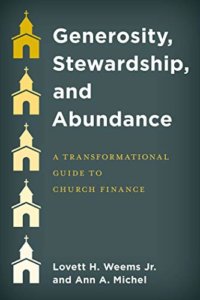Some in the church operate on the assumption that a spiritual perspective on money requires the abandonment of practical thinking. But stewardship expert Ann Michel says a sound theology of stewardship reveals that a spiritual perspective regarding money and finances is practical, and a practical perspective can also be spiritual.
When it comes to money matters or budgeting, does your church split into two camps? On one side are “the green eye shades” who believe the church should think and act like a business. On the other side are “the holier-than-thous” who decry any money talk as akin to money changers in the temple and believe God will provide if the church just has enough faith. These two camps often talk past each other, preventing meaningful dialogue and decision making.
This dynamic is not only unproductive, but it is also misguided because it rests on a false dichotomy—the assumption that a spiritual perspective on money requires the abandonment of practical thinking and that a practical perspective is inherently unfaithful. If we take seriously what scripture and faith teach, we discover that a spiritual perspective regarding money and finances is a practical perspective, and a practical perspective can also be spiritual.
Don’t hear me wrong. I’m not saying that there is no difference between a Christian perspective on money and resources and the dominant cultural perspective. Indeed, the Christian economic worldview is a radical counterpoint to what our culture teaches us regarding money, possessions, and generosity. But when we understand what faith really teaches about money and our responsibilities as stewards of the gifts God entrusts to us, we discover that a faithful Christian approach to finances is neither naïve nor fanciful. Instead, it requires us to work diligently to use our resources to serve God’s purposes.
Putting money in the proper perspective
Given the way a lot of church people talk about money, you’d think it is a pretty unholy, disreputable, dangerous thing. The less we have to think or talk about it, the better. But the problem with this perspective is that Jesus talked quite a bit about money. In fact, he spoke about money more than any subject other than the kingdom of God. Not because money is inherently evil. Rather because living properly in relation to money is a matter of utmost spiritual importance. For individual Christians, the way we use the resources God entrusts to us is a primary way we demonstrate our faith and grow in discipleship. The proper use of congregational resources is a primary way churches align themselves with God’s purposes and propel their missions forward.
Ministry takes money. There is no shame in acknowledging that or in working diligently to protect, sustain, and grow the financial resources that support ministry. Encouraging greater giving, budgeting responsibility, financing capital needs, and developing new revenue streams to support ministry are not accommodations to the world. They are means of transforming the world to the will of God. Money used in positive, God-honoring ways can advance the mission of the church and tangibly help others.
Stewardship is an instrument of God’s abundance.
As Christians, we believe that our loving God cares for us and graciously provides for all our needs. But this faith does not excuse us from acting responsibly when attending to financial matters. God also calls us to be responsible stewards. Believing that God lovingly provides for our needs, we align ourselves with God’s purposes when we exercise prudence in caring for our own financial needs and those of our faith communities. When we carefully steward the things that God entrusts to us, we become partners in God’s mission and help bring forth God’s abundance. To suggest that faith in God’s generosity excuses us from financial prudence is not only naïve and irresponsible, it tempts skeptics to dismiss the entirety of the Christian message about money and stewardship as whimsical and meritless. As stewards, we have a role to play in bringing forth the abundance that God promises by using resources fruitfully and accountably.
Church leadership expert Dan Hotchkiss has written that “it is important to remember that no goal is so purely spiritual that it requires no money, space, or time, and that no action is so financial as to lack ethical or spiritual implications” (Governance and Ministry, 2016, p. 11). The “green eye shades” and the “holier-than-thous” in your congregation can find common ground if you foster a proper understanding of the theology of money and stewardship that bridges the false dichotomy between spirituality and practicality when it comes to church finances.
 Related Resources
Related Resources
- Generosity, Stewardship, and Abundance: A Transformational Guide to Church Finances by Lovett H. Weems Jr. and Ann A. Michel (Rowman and Littlefield, 2021)
- Theology of Stewardship and Biblical Generosity, a Lewis Center video tool kit resource






